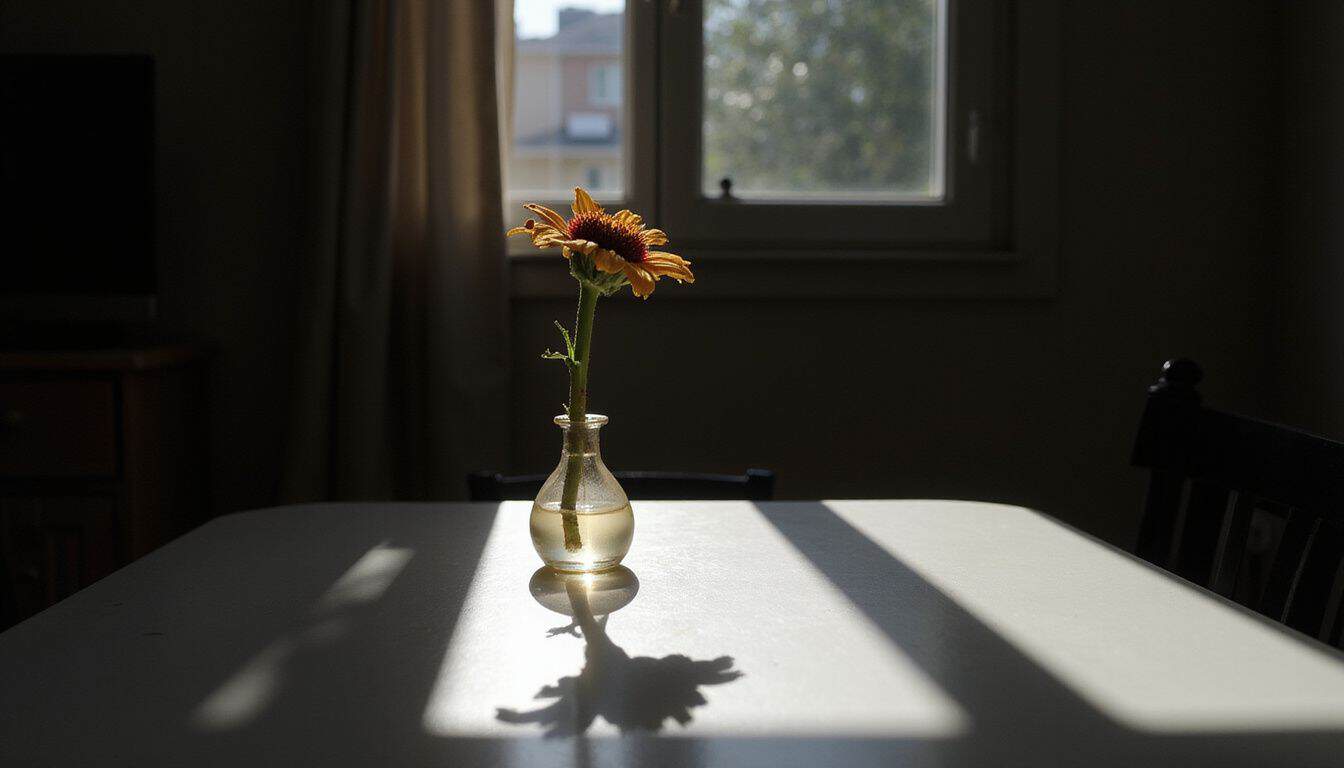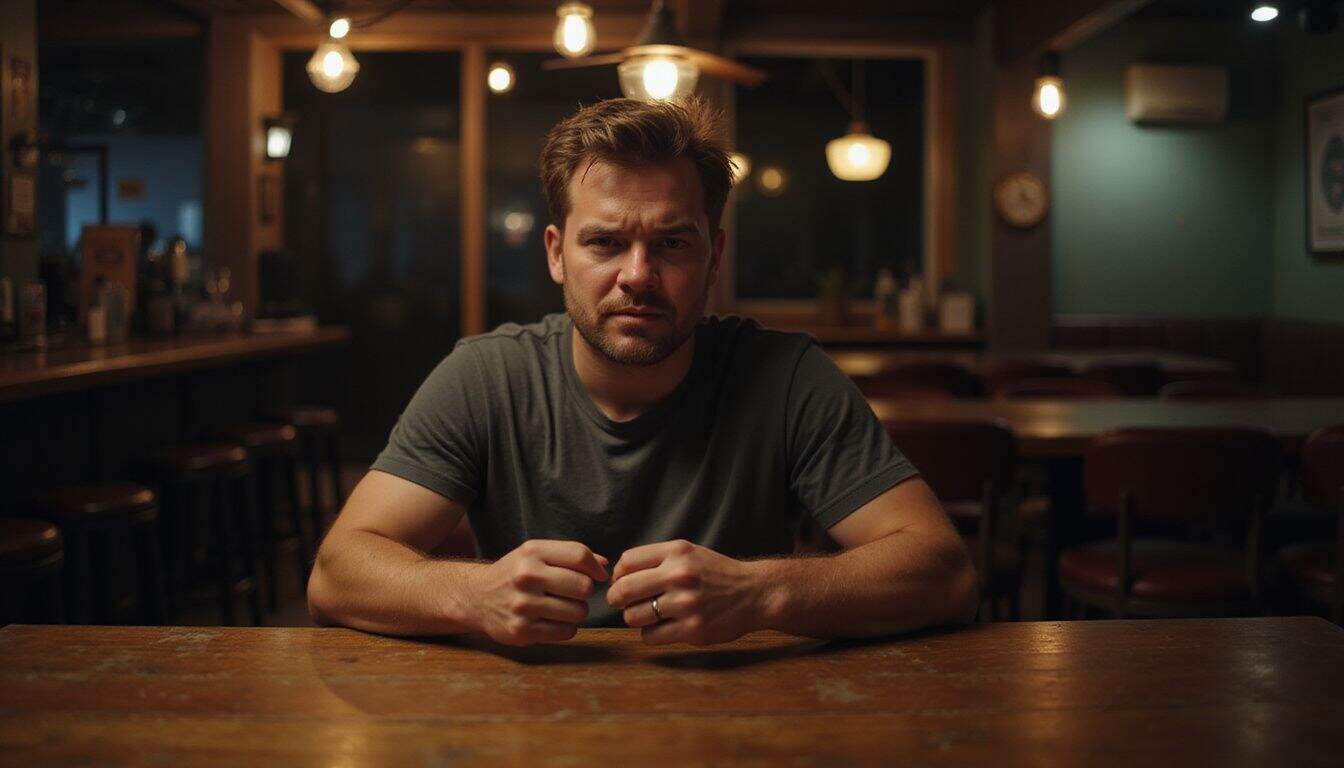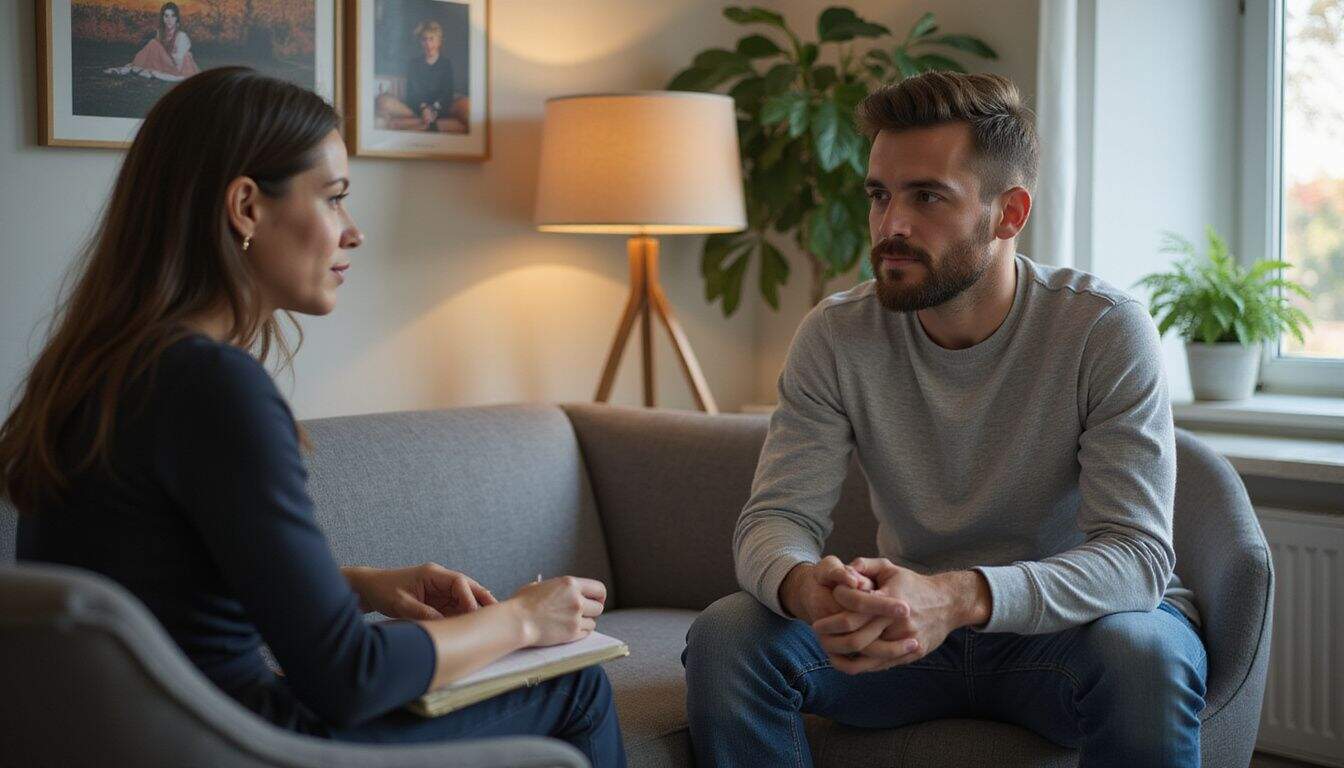Depression in men and relationships can feel lonely, scary, and hard to handle. Many men hide their depressive symptoms due to stigma or fear of appearing weak. This post offers eight practical steps for couples to communicate better, find professional help, rebuild intimacy, and heal together from depression.
Keep reading—you are not alone in this struggle.
Key Takeaways
Men dealing with depression often express it through anger, withdrawing emotionally, or feeling numb—instead of openly showing sadness—making symptoms harder to notice and address.
Depression harms close relationships by reducing emotional closeness, sparking frequent conflicts, and pushing men into isolation from their significant others.
Job pressures, money issues, and societal demands to seem tough can trigger depression; research indicates financial worries strongly affect men earning lower incomes.
Having supportive social connections can significantly reduce emotional distress, particularly for men between ages 18 and 24; healthy routines like good sleep and regular exercise also naturally ease depressive feelings.
Partners can offer meaningful help by talking openly and without judgment, kindly encouraging professional guidance such as counseling, and patiently accepting that healing takes time.
Table of Contents
Signs and Symptoms of Depression in Men

Men often show depression through anger and withdrawal rather than sadness. These hidden signs make it harder to spot and treat male depression before it harms relationships.
Emotional numbness

Emotional numbness builds a barrier between you and your emotions. Many men with depression describe this empty feeling—like seeing the world through a clouded window. You might have low energy, lose interest in activities you once enjoyed, or struggle to pinpoint your emotions.
This disconnected feeling hurts your relationship with your partner, making it tough to share what you’re feeling or respond to their feelings. Flat affect, or showing little facial emotion, can also leave your partner feeling unwanted—even though that’s not your intention.
This emotional numbness isn’t anyone’s fault. It’s a core symptom of depression and gets better with the right support. During depression, your brain’s emotional pathways quiet down.
This change tricks you into thinking your relationship issues cause the pain. But actually, depression itself warps your perception. Getting treatment, such as depression treatments Naperville, can help you regain emotional depth and rebuild healthy connections.
Breaking through emotional numbness takes time—but eventually clears the path toward closer relationships and improved mental wellness.
Irritability and anger

Feeling numb drains you inside—but anger and irritation burst outward. Guys struggling with depression often snap over minor issues or feel tense all day long. That anger isn’t just a bad mood; it’s your mental health signaling for help.
Many men show this frustration through risky choices—like driving way too fast or getting into fights.
Sometimes anger hides deeper feelings: worthlessness, anxiety, or helplessness. You may start drinking heavily or using drugs to quiet these painful emotions. This can become a harmful cycle, hurting both you and your relationship.
Your partner might feel nervous around you, unsure of what might set you off next. Spotting these anger signals early can keep your relationship healthy. Talking to a mental health expert can help you share what’s going on inside—without anger taking control.
Loss of interest in relationships

Aside from anger, men experiencing depression often distance themselves from their partners. They withdraw emotionally, showing little interest in spending quality time together or sharing their feelings.
Dates, intimacy, and small moments of closeness suddenly seem unimportant—they just don’t care like they used to. I’ve worked with many clients struggling this way, and they often talk about feeling “empty”, like their ability to experience love or joy vanishes completely.
This emotional numbness—known medically as anhedonia—prevents men from forming meaningful bonds with loved ones. Activities they previously enjoyed now seem dull or meaningless.
Many don’t realize this numbness signals depression; instead, they might unfairly blame their partner or assume the relationship has naturally faded. A loss in affection can put serious pressure on a relationship, creating a painful gap between partners that feels impossible to bridge.
As a result, their partners may feel hurt, neglected, or unloved—often unaware that depression, not personal rejection, lies at the root of these changes.
How Depression Affects Relationships

Depression can turn a once-loving relationship into a battleground of misunderstandings and hurt feelings. Partners often feel the strain as emotional walls go up, leaving both people stuck in a cycle of distance and pain.
Lack of emotional intimacy

Sadness can quietly erase the warmth between two people in love. Men dealing with depression often feel empty inside, making it tough to express emotions or respond to their partner’s needs.
I’ve watched how this emptiness creates a chill, right in the spot affection once filled. The happiness in spending time together fades, replaced by distance that seems impossible to bridge.
Depression builds walls where bridges should stand.
Low energy and feeling irritable can block closeness and connection. A man might truly want to reach out—yet lack the emotional strength to do so. His self-esteem suffers, and gradually, he may withdraw from his partner.
A slow retreat occurs, often unnoticed by both, until the gap becomes painfully clear. Honest and open conversations can help repair these weakened bonds and bring couples together again.
Increased conflicts and misunderstandings
Depression can turn small disagreements into explosive arguments between partners. For men dealing with depression, even harmless remarks from their partner may feel critical or judgmental.
For instance, a basic question like “How was your day?” could suddenly feel like an accusation. Such misunderstandings trigger defensive replies, causing minor disagreements to quickly spiral out of control.
On top of that, the mental haze associated with major depressive disorder makes conversation tougher—it becomes hard to stay focused, clearly understand what’s being said, or calmly consider responses.
The partner without depression often becomes puzzled by these reactions. They struggle to recognize how their loved one’s mental state leads to sudden anger or shutting down emotionally.
Arguments increase because both sides end up feeling unheard and misjudged. The person struggling with depression might lash out over tiny issues—or simply withdraw and stop communicating altogether.
These behaviors slowly erode trust, creating emotional distance within the relationship. To break this harmful cycle, both partners need honest talks about how depression shapes feelings and changes thoughts during daily interactions.
Withdrawal and isolation
Small misunderstandings can quickly snowball into big relationship problems. Men struggling with depression often pull back emotionally as their symptoms get worse. This retreat creates distance between partners, leaving both feeling lonely—even while sitting right next to each other.
Many men withdraw into silence or fill their days with tasks, avoiding painful emotions altogether. I’ve known friends who lost touch with their partners by spending too many late nights at work or hiding away in garage projects.
These men often experience guilt over their emotional absence. Such guilt deepens their isolation, creating a cycle that’s tough to escape. Less talk means more hurt—for both partners.
Often, partners mistake this emotional distance as rejection or fading love rather than signs of hidden mental health issues. Without honest conversations, both individuals end up quietly hurting.
Research indicates that men who withdraw and isolate themselves are less likely to seek help and are also less likely to feel happier after events like divorce, compared to men who maintain meaningful connections with friends and family.
Common Triggers for Depression in Men

Men often face depression from work stress, money problems, and pressure to “be a man” – learn how these triggers impact mental health and what you can do to help yourself or your partner.
Work and financial stress
Money problems hit men especially hard. Studies show financial stress can cause depression—particularly among guys earning lower incomes. I’ve seen how mounting debt and unpaid bills can crush a man’s confidence and sense of worth.
Losing a job or facing money issues frequently leads men into deep sadness, which then seeps into their personal relationships. Our society still puts strong pressure on men to provide financially, making setbacks feel like real personal failures.
Financial stress doesn’t just empty your wallet—it drains your emotional reserves too.
Debt only worsens mental health issues. Research finds a clear link between heavier debt levels and increased depression symptoms. This creates a tough cycle: money worries cause poor sleep, angry outbursts, and emotional withdrawal from loved ones.
Many guys hide these struggles, turning quietly to drugs or alcohol rather than seeking support. Practicing stress relief methods and developing healthy coping skills can help stop the cycle.
Open communication about money issues with your partner can strengthen your emotional bond during stressful periods.
Societal expectations of masculinity
Guys face serious pressure every day to look tough and manly. Society says men must show strength, status, and toughness—and avoid anything feminine. Such rigid ideas cause real mental health struggles.
I’ve seen friends skip therapy for their depression, scared they’d look weak. Research supports this too—strict masculine norms lead directly to higher rates of substance abuse and lower use of mental health services.
In fact, just 14% of young men visited a mental health expert last year. This gap occurs because many guys see therapy as contradicting strength. Anti-feminine attitudes worsen the issue, creating hostility and limiting paths to help.
These unhealthy expectations trap men into silently suffering, rather than risking judgment.
Relationships also suffer from this push to “act tough”. Men often mask their emotional pain through anger or numb indifference. Some guys turn to drinking or burying themselves in work instead of opening up about feelings.
This emotional shutdown creates distance between partners. The pressure to be a tough guy blocks vulnerability—the very thing needed to form strong connections. Many men feel caught between what society demands and what they actually need.
To escape, guys need encouragement to challenge these toxic rules. They deserve freedom to express what they feel, get support, and heal without fearing judgment about their masculinity.
Health challenges and aging
Social factors aren’t the only things that can lead men into depression—physical health can also play a big role. As men age, they often face new medical problems, like heart disease, diabetes, or chronic pain.
These illnesses can mess with sleep, sap energy, and disrupt daily routines. Adjusting to these changes can be hard, especially for men who see their strength as part of their identity.
Certain health conditions directly affect brain chemicals, leading to depression. Low testosterone, seen often in older men, can lessen energy levels and darken moods. Even pain medicines sometimes affect a person’s mental state and well-being.
Regular doctor visits help spot these problems early, before they grow worse. If physical issues seem linked with your mental health, open up to your doctor about it. Many men get relief by combining medical treatment with mental health care and support.
Coping Mechanisms for Men with Depression

Men can break free from depression with the right tools and support. Healthy habits, strong social bonds, and stress control methods work together to lift the fog of depression.
Building social support networks
Strong social ties help men combat depression. Studies confirm that social support directly eases mental distress in men. This benefit is most noticeable among young men aged 18 to 24, yet it also helps older groups.
I know how hard it feels to reach out during tough times—so start simple. Maybe text a friend this week, or join an online community related to something you enjoy. Social groups offer safe, relaxed spaces to open up without feeling judged.
The strongest medicine for depression is often found in the company we keep.
Talking with others helps break the isolation cycle, which can make depression worse. Your network might include family members, coworkers, friends, or even mental health communities.
These interactions lower stress and improve self-esteem levels. Some men prefer socializing naturally through group activities like sports or hobby groups. You don’t always need to discuss problems openly—feeling connected to people who genuinely care is what matters most.
Developing healthy lifestyle habits
Your mind and body team up every day to shape how you feel. Small changes in your daily habits can help fight depression and lift your mood. Start by getting enough rest—most men need around 7 to 9 hours of quality sleep each night.
Poor sleep can worsen depression, but improving your sleeping habits can greatly boost your mood. Also, pay attention to foods that nourish your brain. Fish rich in omega-3 fatty acids, or leafy greens like spinach packed with B vitamins, strongly support your mental health.
Diet impacts your mood in surprising ways—you may feel better just by eating well.
Staying physically active naturally brightens your outlook. Even a quick 20-minute walk each day releases mood-boosting brain chemicals. Lots of men find exercise more effective for managing stress than negative patterns like unkind self-talk or substance abuse.
Regular relaxation habits, like deep breathing or progressive muscle relaxation, are another way to ease anxiety. These methods soothe your nervous system and help you stay calm. By combining healthy sleep, nutritious eating, frequent exercise, and stress-relief methods, you build a solid mental health foundation.
Practicing stress management techniques
Depression can hit men especially hard, turning everyday tasks into huge hurdles they dread facing. Yet, finding humor—even in tough times—can ease stress and lift your spirits.
Research reveals that men who notice small positives during difficult periods handle depression better. Simple methods, like five-minute deep breathing exercises or taking a quick, refreshing walk, help clear the mind.
Small actions like these break the pattern of avoidance, which often worsens depression.
Many men struggle with stress by trying to manage emotions on their own. Unfortunately, this approach often leads to unhealthy habits like denial or substance abuse. Relaxation methods, such as muscle relaxation exercises or guided imagery, help ease tension in mind and body.
Physical activities also help by boosting brain chemicals that reduce depression symptoms. Exercise even improves the quality of sleep. Everyone’s different, so the trick is finding stress relief methods that click for you—chatting with friends, keeping a journal, or practicing mindfulness.
Small adjustments in dealing with stress can greatly improve mental health and strengthen relationships.
Supporting a Partner with Depression

Supporting your partner through depression takes patience and care. Your actions can make a huge difference in their healing journey.
Open and non-judgmental communication
Men facing depression need real, honest conversations without judgment or blame. Clear, kind words make people feel safe—this safety lets emotions come out freely. I’ve noticed that criticism tends to shut down discussions, especially during hard moments, and pushes loved ones further away.
It’s better to just listen openly, with care and patience. Simple phrases like “I hear you” or “That sounds really tough” tell your partner you’re paying attention—and that their feelings truly matter.
Many men worry about seeming weak or vulnerable, so accepting and validating their pain builds real trust. Consider setting regular times to connect, maybe over a Sunday morning coffee or quiet evening strolls.
Making a habit out of these talks keeps you both closer as you work through tough emotions. It also makes seeking professional support simpler, as healthy communication already feels familiar and comfortable at home.
Encouraging professional help
Reaching out to a mental health professional is a big, positive step in getting better. Many men hold back from therapy—thinking it means they’re weak. Honestly, I used to feel that way myself, until I gave it a shot.
BetterHelp makes starting therapy easy—they set you up with a therapist in just 48 hours after you answer a short assessment. Professional help matters a lot, especially if lifestyle changes and talking with friends aren’t enough.
Therapists teach valuable skills for handling depression, skills that can be hard to discover on your own. If your partner wants to help, suggesting therapy gently and with compassion works better than pushing too hard.
If online therapy doesn’t seem right, local mental health groups or helplines can be just as helpful. These services provide experienced, understanding staff who know how to support men dealing with depression—without judging.
An effective therapist can spot negative patterns in your thinking and teach useful ways to cope, tailored specifically for your situation. Taking the step into therapy often improves relationship skills and helps communication, as you get better at sharing emotions in a healthy manner.
Setting realistic expectations
Setting realistic expectations can help couples tackle depression together, even when things seem tough. Men sometimes feel pressure to quickly “fix” issues—but healing is gradual and takes patience.
Being calm and understanding, even through rough patches, is your strongest tool in this journey. Some days will just naturally feel harder than others—that’s normal. Having open conversations about feelings creates a strong foundation for what both partners should expect.
It doesn’t mean giving up hope, just adjusting your expectations to what reality truly looks like.
Creating daily routines adds stability, especially on days when emotions feel overwhelming or scattered. Simple activities, like taking a short morning walk or chatting briefly each evening, build a comforting sense of order.
Enjoying hobbies together can help you bond without feeling pressured to talk about difficult feelings directly. Many men feel more relaxed and comfortable doing activities side-by-side instead of facing each other and talking deeply.
Your mental health gradually improves as you balance realistic thinking with hopeful attitudes. Every small step counts—especially on days depression makes simple actions feel challenging.
The Role of Therapy in Healing Relationships

Therapy offers a safe space for couples to heal from the effects of depression, with both individual and joint sessions helping men express their feelings while fixing broken bonds in their relationship – read on to learn how talking with a mental health pro can save your marriage.
Individual therapy for men
Men sometimes find opening up about feelings in group settings challenging. In one-on-one sessions, guys have a private space to talk openly, without feeling judged. Many men feel more comfortable discussing tricky topics—like work pressures, relationship issues, or past hurts—with a single listener.
Companies like BetterHelp provide online assessments, matching men with suitable therapists within 48 hours, so support becomes easier to reach.
Talk therapy can help men spot thought patterns that feed depression. A skilled mental health expert teaches clear, usable skills—to handle anger, ease isolation, and build self-esteem.
Some men hold back from therapy because of outdated, anti-feminine views, missing important emotional support. I’ve closely watched a few sessions move my brother from steady irritability toward effectively handling life’s stresses.
Individual therapy helps bring down emotional barriers that prevent men from feeling fully alive.
Couples counseling for relationship dynamics
Couples counseling provides partners a secure, supportive environment to tackle issues linked to depression. Solution-focused therapy encourages couples to find practical answers together, instead of focusing on past hurt or blame.
In my own practice, I’ve watched men comfortably share feelings and struggles in joint sessions that might feel impossible alone. A therapist guides conversations neutrally, helping partners see clearly how depression shapes their specific relationship patterns.
Many men discover therapy helps them talk openly about tough issues—such as intimacy concerns and emotional needs—that might usually stay hidden. The American Psychological Association notes that couples who attend sessions together have better results compared to those with only one partner involved.
During therapy, partners learn how to offer effective emotional support, without accidentally encouraging unhealthy patterns. Skilled therapists spot distorted thinking that leads to arguments, then teach couples how to break these negative cycles.
With this approach, sessions strengthen emotional connections, while directly addressing the emotional emptiness and intimacy struggles that depression often brings into relationships.
Preventing Relationship Strain

Preventing strain in your relationship takes daily effort, but small steps like sharing feelings, setting aside time for each other, and creating a safe space can build a strong bond that withstands the storms of depression.
Ready to learn more about these healing steps?
Fostering emotional vulnerability
Men often hide their feelings behind emotional walls, afraid they’ll face judgment. These barriers can keep partners from forming deeper connections. But breaking down those walls starts in small, manageable ways.
Each day, try sharing one worry or hope with your partner. Even a small disclosure helps make a safe space, where you both feel comfortable opening up without worry. Many men shy away from showing vulnerability because society pressures them to act tough—yet real strength lies in being honest about feelings.
Both partners need to practice openness to help their relationship grow stronger. The benefits of sharing honestly far outweigh any initial discomfort. Couples who talk openly about their fears and dreams build stronger trust and feel closer to each other.
This openness cuts down misunderstandings, improves problem-solving, and even reduces fights.
Your partner can’t guess what’s on your mind, so speaking openly about your feelings matters—even if it feels a bit uncomfortable at first. Taking this emotional chance can lead to a relationship that’s healthier and happier, boosting your mental health along the way.
Prioritizing quality time together
Quality time helps bridge the emotional gaps created by depression. Setting aside regular moments to connect with your partner can greatly improve your relationship. I learned firsthand how spending just 30 minutes a day fully engaged with my partner helped strengthen my own marriage during hard times.
This means putting away phones, letting go of work worries, and actually hearing each other’s thoughts. Simple things like cooking dinner together, taking evening strolls, or watching a favorite TV show open the door to honest talks about feelings.
These relaxed moments ease the loneliness depression often brings.
Making time for your partner clearly shows them they matter, even during moments depression pushes you apart. Schedule regular date nights; they don’t have to be fancy or pricey. The important part is building a safe, comfortable atmosphere where each person feels seen and valued.
And as emotional bonds grow stronger, physical closeness usually improves too. A caring environment makes it easier to openly discuss mental health without feeling ashamed or judged.
Both partners need to keep putting effort into this supportive space.
Creating a supportive environment
Your home needs to feel safe—not just for spending time together—but also for honest conversations about difficult feelings. Men often find opening up emotionally difficult, fearing judgment or rejection.
I’ve noticed how tiny changes in your living area greatly impact mental health. Clear out messy clutter, since clutter adds stress and anxiety. Set aside quiet spaces, designed specifically for open talks without interruptions.
Easy touches like comfortable chairs, gentle lighting, and less background noise ease the nervous system during tough emotional moments.
Your physical environment should reflect your emotional support. Mental health experts emphasize that partners need patience and compassion during recovery. Avoid rolling your eyes when he shares emotions, put phones down during important conversations, and don’t bring up past hurts.
The American Psychological Association highlights that learning about depression helps partners offer more effective support. Educate yourselves together about signs of depression in men.
Keep phones away during meals, and agree to stop harsh criticism. These small actions help create trust, making it simpler for men to share their struggles with emotional numbness or low self-esteem.
How Will Our Understanding of Men’s Depression and Relationships Evolve in 2025?

By 2025, we’ll have a better grasp on male depression. Research clearly shows certain masculine expectations—such as appearing tough, powerful, or successful—make it harder for men to openly address mental health struggles.
Today, medical professionals widely accept depression as a genuine health problem, not a sign of weakness. Upcoming approaches will encourage positive forms of masculinity instead of old-fashioned stereotypes.
These newer methods will allow men to comfortably seek treatment, without shame, which can also help their relationships grow stronger.
Mental health services will soon feel much friendlier to men. Couples counseling will start to better recognize the unique ways men express emotional distress—such as anger, irritation, or substance abuse—instead of just sadness.
Therapists will offer welcoming environments where men can openly share feelings without fear of being judged. Partners will also gain helpful tools to support men through depression and still care for themselves.
With these shifts, couples will share deeper emotional bonds and experience happier, healthier relationships together.
People Also Ask
How does depression in men affect relationships?
Depression in men often creates emotional distance within relationships. It can lead to alcohol abuse, drug misuse, or problems in sexual intimacy. Men might respond with anger, irritability, or risky behaviors instead of openly showing sadness.
What are common depression symptoms in men?
Common signs of male depression include headaches, trouble sleeping, and sudden changes in mood. Men may withdraw socially and start avoiding friends and family. Some may use drugs or alcohol to numb emotional pain, and self-esteem often drops sharply.
At what point should couples seek professional help for depression?
Couples should reach out for professional support as soon as depression starts causing persistent arguments, stress, or thoughts of suicide. Mental health experts provide accurate diagnoses and appropriate treatment options. Early help prevents depression from escalating into more serious issues.
Can couples therapy help with male depression?
Yes, couples therapy can significantly help men facing depression and their partners. Emotionally-focused therapy teaches couples how depression is a medical issue rather than a personal shortcoming. It boosts emotional closeness, improves how partners communicate, and helps them handle challenges as a team.
How can partners support men with depression?
Partners can encourage honest, judgment-free conversations. Help him seek professional support from a psychologist, counselor, or referral services like the Veterans Crisis Line. Even small gestures—like offering favorite meals or sincere compliments—can lift his spirits and ease despair.
What lifestyle changes help couples dealing with depression?
Eating healthy foods rich in nutrients like folate boosts both mental and physical health. Regular exercise helps fight depression by lifting mood naturally. Maintaining healthy sleep routines, reducing stress through calming activities, and making time for enjoyable shared hobbies can bring partners closer emotionally.
References
https://www.healthline.com/health/feeling-numb
https://www.betterhealth.vic.gov.au/health/conditionsandtreatments/anxiety-and-depression-in-men
https://www.helpguide.org/mental-health/depression/depression-in-men (2025-01-22)
https://bestmindbh.com/blog/how-depression-affects-relationships-and-what-you-can-do/
https://www.northpointnebraska.com/addiction-rehab-blog/how-depression-impacts-your-relationships/
https://pmc.ncbi.nlm.nih.gov/articles/PMC8863240/
https://pmc.ncbi.nlm.nih.gov/articles/PMC7036518/
https://www.healthdirect.gov.au/depression-in-men
https://pmc.ncbi.nlm.nih.gov/articles/PMC10946545/
https://pmc.ncbi.nlm.nih.gov/articles/PMC2921311/
https://pmc.ncbi.nlm.nih.gov/articles/PMC3852369/
https://www.cdc.gov/mental-health/living-with/index.html
https://boldhealthinc.com/a-guide-to-supporting-your-partner-with-depression/ (2024-05-20)
https://wewantrelief.com/10-coping-strategies-for-partners-of-people-with-depression/ (2024-10-12)
https://www.helpguide.org/mental-health/depression/helping-someone-with-depression
https://atlanticbehavioralhealth.com/does-couples-therapy-work-for-relationship-healing/ (2024-10-16)
https://pmc.ncbi.nlm.nih.gov/articles/PMC10087549/
https://psychcentral.com/relationships/trust-and-vulnerability-in-relationships (2022-04-18)
https://pmc.ncbi.nlm.nih.gov/articles/PMC2729718/
https://pmc.ncbi.nlm.nih.gov/articles/PMC3150158/
https://www.brightlightcounselingcenter.com/post/navigating-depression-in-relationships
https://www.verywellmind.com/relationships-and-depression-10-tips-to-cope-1067466
https://www.sciencedirect.com/science/article/abs/pii/S0272735816300046

